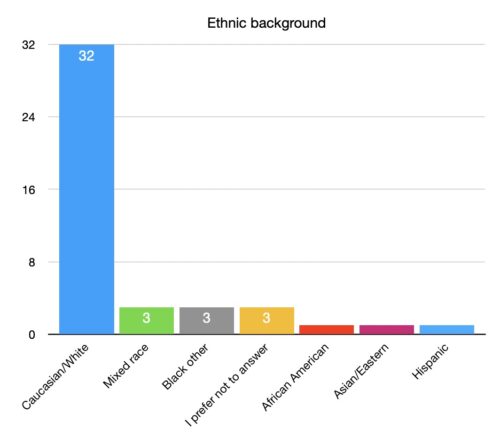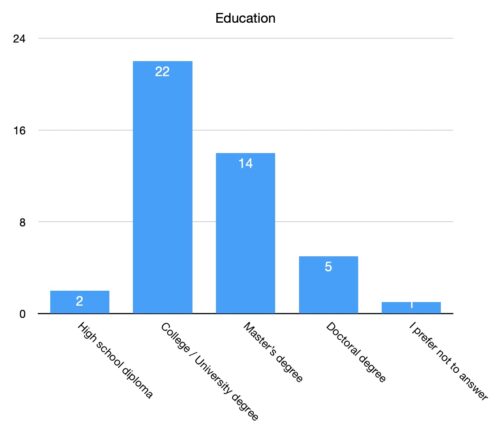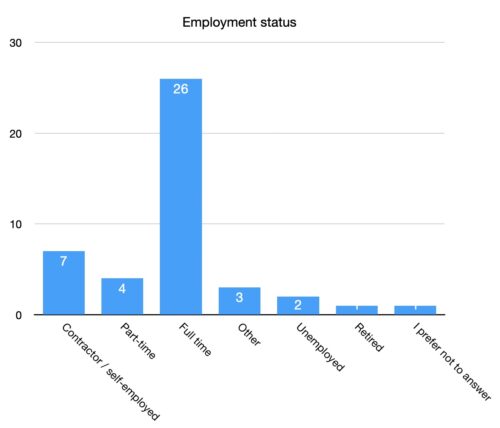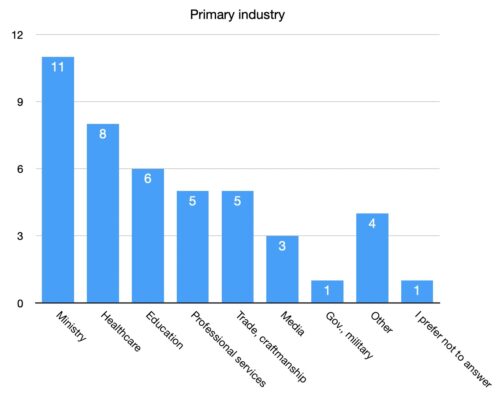Survey Results
Executive Summary
This executive summary outlines the principal findings from the Leadership Survey, aimed at understanding the leadership training requirements of lay leaders in the European Seventh-day Adventist context.
The online survey, developed by The Andrews University School of Leadership and executed by HIM Research Institute, collected 44 responses from attendees and representatives of ASI chapters & ministries present at the ASI Europe Convention held in Sofia, Bulgaria, 23-26 October 2024.

Summary
Key Findings

1. Lack of formal training in leadership
The vast majority of respondents (73%) have not received any formal training in leadership, either through academic programs or certificate courses.
Only 27% indicated having some form of formal leadership training, with the majority of those being MBA programs. Other training included an MA in project management, leadership in science and research, management training. Other respondents mentioned various short courses or workshops.
This finding aligns with our initial assumptions and prior observations. However, it was surprising that none of the respondents identified any academic programs (such as a Certificate, MA, DLead, or PhD) as part of their formal leadership training.
Additionally, there was no mention of training in spiritual leadership.

2. Key priority: developing spiritual leadership
Respondents indicated that their primary focus in leadership development is on cultivating spiritual leadership through discipleship programs.
Many respondents highlighted a critical need for more leadership training and education within the church, particularly in applying these principles in secular environments. There's also a perceived lack of spiritual leadership, with concerns that administrative skills are prioritized over a God-led, spiritually focused approach.
The strongest interest in developing leadership skills related to Leadership & self, followed by Leadership & others and Leadership & organizations.
Key aims are: refining essential leadership abilities, boosting communication and interpersonal skills, and fostering empowerment through collaborative efforts.

3. Engage in dynamic & interactive learning
Participants show a strong preference for leadership development activities featured in seminars and conferences.
Interest in certificate programs is moderate, whereas academic programs garner the least interest among the options available.
The most common learning styles among respondents were visual, reading/writing and auditory.
Findings indicate that the optimal learning format for leadership development is a hybrid approach, integrating online and in-person elements. The online segment could feature Zoom sessions, recorded videos, and resources hosted on a specific platform, whereas the in-person component will involve direct presentations.
Survey Detailed Results

Q1. Have you ever received formal training (academic or certificate) in leadership?
(Please select one answer, YES / NO)

Q1. RESULTS
NO - 32 answers, 73%
YES - 12 answers, 27%
If YES, please describe your formal training in leadership?
(12 answers)
4 - MBA
1 - MA in project management
1 - Leadership in science and research environment
1 - Management training in / for multiples areas company
1 - one semester project
1 - part of professional/continuous training
1 - short training
1 - courses
1 - a 3-week training in the company
Q2. What is your preferred learning format?
(Select one answer)

Q2. RESULTS
ONLINE - 7 answers, 16%
IN PERSON - 10 answers, 23%
HYBRID - 27 answers, 61%
Online & Media assets
(Zoom, recorded videos, resources on a dedicated platform)
In person
(face to face presentations, supported by a dedicated resource platform)
Hybrid
(both online and in person)
Q3. Order the following six leadership areas from your highest level of interest (6 points) to your lowest level of interest (1 point).
(Participants were asked to move the options using drag and drop method.)

Q3. RESULTS
- Leadership & self - 200 points
- Leadership & others - 185 points
- Leadership & organizations - 171 points
- Leadership & mission and ministry - 151 points
- Leadership & culture and community - 126 points
- Leadership & research - 91 points
Leadership & self
(personal development, worldview, faith and spiritual practices, self-care, resilience, ethics, character development)
Leadership & others
(communication, developing others, coach/mentor, affirmation of women)
Leadership & organizations
(integrate mission into strategy, teamwork, delegation, management, organisational dynamics, systems and sustainability)
Leadership & mission and ministry
(Christian servant leadership, biblical framework of holistic ministry, ministry of reconciliation)
Leadership & culture and community
(cultural intelligence, social entrepreneurship and innovation, social service and development)
Leadership & research
(research for decision-makers, reviewing research, doing research, publishing research)
Q4. Order the following leadership programs from your highest level of interest (4 points) to your lowest level of interest (1 point).
(Participants were asked to move the options using drag and drop method.)

Q4. RESULTS
CONFERENCE - 129 points
SEMINARS - 139 points
CERTIFICATE - 102 points
ACADEMIC - 70 points
Leadership Conference
(one weekend, annually)
Leadership Seminars
(in person / on-line, several times a year, presentations & resources)
Leadership Certificate
(12-18 months, CEUs & Leadership certificate)
Academic
(several years, MA, DLead, PhD)
Q5. What is your preferred learning style?
(Select up to 2 responses.)

Q5. TOP 5 RESULTS
(in pairs)
- Visual & reading/writing - 10 answers
- Visual & auditory - 8 answers
- Reading/writing & verbal - 6 answers
- Visual & verbal - 4 answers
- Visual & logical/mathematical - 4 answers
Q5. TOP 5 RESULTS
(individually)
- Visual - 30 answers
- Reading/writing - 20 answers
- Verbal - 12 answers
- Auditory - 11 answers
- Social - 7 answers
Q6. Tell us about your view on leadership as a Seventh-day Adventist believer.
(Participants were asked to answer in 1-2 sentences.)


Q6. Synthesis
Participants' views on leadership center around the example of Jesus Christ, emphasizing servant leadership, humility, and leading by example.
Many respondents highlighted a critical need for more leadership training and education within the church, particularly in applying these principles in secular environments. There's a perceived lack of spiritual leadership, with concerns that administrative skills are prioritized over a God-led, spiritually focused approach.
While some believe the church has capable leaders, others point to haphazard selection processes based on popularity rather than qualification, and a need for greater female representation. Several emphasized the importance of prayer, spiritual growth, and developing leadership skills to empower others and achieve organizational goals. Some respondents expressed concern about the practical application of Adventist beliefs to leadership, while others felt there were no significant issues.
Overall, there's a strong call for more intentional leadership development grounded in Christian service and spiritual principles.
Servant leadership / leading by example
- Church leadership should be servant-based and example-led.
- Leadership in the Seventh-day Adventist Church is often seen through the lens of service and stewardship, reflecting the Christian principle of servant leadership. This approach emphasizes humility, service to others, and leading by example rather than authority or power.
- Christian leadership is the art of leading people by serving them.
- A leader should lead by example. Service. Sacrifice if necessary.
- We are all meant to lead people to Christ by example and more directly.
- Following the model of Jesus and being a servant leader
- Being a servant and a peacemaker
- Leading by caring
- The best way to lead as a Seventh-day Adventist believer in my opinion is with a heart of a servant. Jesus is followed by so many only because He teaches us how to serve others.
- It involves being a good example for your followers and taking care of them.
- Biblical leadership is equal with servitude and that is one aspect not very promoted even though it’s the most important.
Lack of training and education
- Leadership training is desperately needed at many levels in the church and lay-led organisations.
- We lack education.
- Scarce, need more education on that. Even within the church, need leadership qualities to properly manage one department not only background knowledge.
- We should be more empowered and prepared to work in secularised environment. Need more support as community to access resources and support.
- Very little knowledge.
- Generally poorly trained or equipping of leaders
- We are all called to be leaders. However, we have different understandings of what a leader is or does. Therefore we should all train and strive to learn to be proper leaders.
- It is very necessary to invest more in this for future!
- It should be mandatory especially servitude. There is not enough understanding and training should be accessible to all.
Growing / development
- There is room for improvement.
- To lead inspired by God, using and developing your skills
- A leader to be trained by the Trainer.
- Leadership is a form of servanthood that extends the responsibility for growth beyond the limits of self.
- Christian Leadership is help people to achieve better results and live as responsible stewards of all God has given us.
- The church needs leadership. In all life dimensions and also in the church there’s a need for learning, explaining and developing.
- We need progression leadership. One study other. After other this other study another and so on.
- Leadership is about enabling others to grow whilst delivering organisational aims. Leaders breed leaders.
Should follow Jesus
- Follow the example of Jesus
- As a leader we have to teach the youth to become active followers of Christ.
- Following the model of Jesus and being a servant leader
- Should be God led
A need for spiritual leadership
- The imperative need for a spiritual approach and spiritual oriented leadership. I think in the past we had some great examples of spiritual leadership, and closer we come to our days we meet more administrators then leaders, and a critical lack of spiritual leadership.
Generic views (Misc.)
- The church rises or falls on the quality of leadership
- To be a leader is to pray for and obey God's voice for my personal life and for the organization; to keep the organization on track, to take care of the team, to love and serve.
- The leader prepares the way of the Lord.
- It’s quite pivotal to our faith. Great leaders is what we need to move forward.
- Leadership is essential in organising ministry work and evangelistic initiatives
- From my perspective as a faithful manager, I consider this to be a delicate challenge, as it is essential to find a balance between my faith principles and my professional responsibilities. However, I also believe that this challenge comes with a great responsibility to act with integrity, compassion, and respect toward the team and the company’s objectives. In this context, my faith provides me with the necessary guidance to make the right and ethical decisions.
Issues
- Haphazard. People chosen on popularity or being a charismatic speaker. Need more females in senior leadership positions.
- Lot of responsibility not always well used
- Very academic
- I don’t see connections between leadership, management and adventist beliefs... practically.
- Leading is a lot more than preserving. We need spiritual mobilising, an awakening. Prayer as starting point for anything we plan or do.
No issues
- There are quite a few people who are prepared for this.
- I believe that God gave us some principles based on which we make decisions.
Q7. There are dozens of leadership models/theories. Please describe the one you are most familiar with.
(Participants were asked to answer in 1-2 sentences.)

Q7. RESULTS
Servant leadership - 11
Not familiar with any / undecided / no answer - 9
Lead by example - 5
Jesus leadership - 3
Coaching leadership - 2
Delegate leadership - 2
Democratic leadership - 1
Youth leadership - 1
Transformational leadership - 1
Teacher model - 1
Hierarchy model - 1
Friendship leadership - 1
Team of teams leadership - 1
Other answers

- The leader who gains respect through competence
- An active leader who shares the burden with those who are led by him
- The leader is going in front of the others or intentionally put himself backstage to coordinate the team.
- One by one make disciples.
- Collaboration
- Being a leader is being able to think about more than yourself and transmitting a vision to a whole team, leading them to the goal
- Management by objectives
Q8. What are your most important leadership development needs for the next 2 years?
(Participants were asked to answer in 1-2 sentences.)


Q8. Synthesis
Over the next two years, respondents identified several key leadership development needs. A strong emphasis was placed on spiritual leadership, including developing spiritually oriented discipleship programs and focusing on spiritual resources.
Many desired to improve core leadership skills through courses and practice, focusing on techniques and application. Communication and interpersonal skills were also highlighted, with a desire to learn how to handle difficult people and situations, improve assertiveness, and provide constructive feedback. Empowering others and teamwork were important goals, including delegation, committee skills, and collaborative leadership.
Self-leadership and personal development needs included improving motivation, planning, self-confidence, and communication skills. Several respondents wanted to enhance their leadership and management skills, particularly in strategic planning, financial viability, team building, and leading remotely.
Specific areas of focus included leading youth, early childhood education, and large-scale missionary efforts. Developing a clear vision and strategy, along with organizational skills, was also mentioned.
Some respondents expressed a desire for more tailored approaches to leadership development, while others were unsure of their needs or not interested in development.
Leadership of self / self development
- Improving my motivation and planning skills
- To develop my capacity of speaking directly, with no hesitation. Always saying what is right and what is wrong.
- Ability to lead me, as a non-clergy woman.
- Building self confidence and improving my formal communication skills.
- Need to be a leader to myself and not let life happen to me simply
- Lead by example
- I need to upgrade my mindset so I can better take advantage of the many opportunities that God has given me and walk in them boldly, rather than procrastinating.
- To be a servant
Leadership and management
- To learn core skills to do strategic planning effectively, make ministry financially viable, attracting new team members.
- How to work better with people and how to grow an organisation as a leader
- Leading teams remotely in different locations
- Leader in my family and in our new private Christian primary school.
- How to lead effectively
- Leading a fledgling ministry to become self sustaining
- Developing more sophisticated algorithms that better understand and respond to the nuances of different leadership contexts, such as cultural, organizational, and individual differences that impact leadership styles and effectiveness.
Vision / strategy
- Vision within the mission
- More structure and clarity
- Strategy
- More organized
- I desperately need suitable methods and approaches for all kind of people
- Strategic development and implementation in the church
- I need to work on my skills to influence and be effective with general church people and not just business or ASI type church people.
Spiritual leadership
- To learn how to lead others (coaching) especially in spiritual terms (mission), and also to learn and improve on leadership of organisations.
- Spiritual leadership
- Godly leadership
- To start a spiritual oriented discipleship program with local level leaders and prepare them to become able to train others spiritual leaders
- More focused on spiritual needs and resources.
Learning more about it / take a course
- Maybe a course
- Course
- Would like to have a good handle on different techniques and how to apply them. Bespoke approaches.
- Practice more and learn more about a good way to lead.
- To be equipped for the area that God has called me to
Lead / train specific categories
- How to lead the youth in the church
- Improving leadership in early childhood education
- To give priority to train leaders at the local level
- To lead thousands of missionary people in a national plan
- Training managers of our institutions
- Multiplying Caregroups
Empowering others / teamwork
- Empowering others to take over different responsibilities.
- The principles of delegation
- Committee chairmanship skill
- How to teamwork with other leaders
- Equipping others to take over the responsibility
Communication / crises and change management
- Clear communication/assertiveness. Learning to deal with difficult people/situations.
- How to approach those who are difficult to change
- I need to work more on boundaries
- Working with difficult people.
- Developing communication skills and providing constructive feedback
General
- General in all areas
I don’t know
- I really don’t know
- I don’t know
Not interested
- It is not my goal to develop this skill.
Conclusions
Significant Gap in Formal Leadership Training
A large majority of respondents lack formal leadership training, indicating a significant gap in leadership development opportunities within their context. This lack of formal training may hinder their ability to effectively lead and may contribute to the perceived need for improved leadership skills among the respondents.
Strong Emphasis on Spiritual Leadership Development
A key finding is the strong emphasis placed on developing spiritual leadership. This suggests that leadership within this context is deeply intertwined with spiritual values and principles, and that leadership development initiatives should prioritize these aspects.
Preference for Dynamic and Interactive Learning
Respondents demonstrated a preference for dynamic and interactive learning formats, favoring seminars and conferences over more traditional academic programs. They also indicated a strong preference for hybrid learning approaches, combining online and in-person elements, suggesting a desire for flexibility and a variety of learning experiences.
Recommendations
Prioritize Accessible and Affordable Formal Training
-
- Recommendation: Implement accessible and affordable formal leadership training programs, such as short courses, workshops, and certificate programs, specifically designed for the target audience. These programs should be easily accessible, potentially offered online or in easily reachable locations.
- Rationale: This addresses the significant gap in formal training and provides participants with structured learning opportunities to develop essential leadership skills.
Integrate Spiritual Development into Leadership Training:
- Recommendation: Develop leadership training programs that explicitly integrate spiritual development. This could include incorporating spiritual principles and values into leadership models, providing opportunities for spiritual reflection and growth, and inviting spiritual leaders to contribute to the training.
- Rationale: This recommendation directly addresses the strong emphasis on spiritual leadership development identified in the findings and ensures that training aligns with the participants' values and priorities.
Offer Diverse and Engaging Learning Formats:
- Recommendation: Offer a variety of learning formats, including seminars, workshops, conferences, online courses, and hybrid options that combine in-person and online elements. This will cater to the diverse learning preferences of participants and provide flexibility for individuals with varying schedules and commitments.
- Rationale: This recommendation ensures that leadership development programs are engaging and accessible to a wider audience, increasing participation and maximizing the impact of training.
















